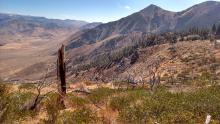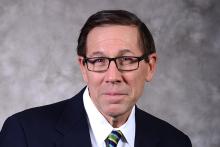A warming climate and more frequent wildfires do not necessarily mean the western United States will see the forest loss that many scientists expect. Dry forest margins may be more resilient to climate change than previously thought if managed appropriately, according to Penn State researchers.
Content Administrator
Queering Geopolitics/Queering Pandemic
This Coffee Hour is co-sponsored by: the Department of Women's, Gender, and Sexuality Studies; the Department of Asian Studies; the Rock Ethics Institute, and the Center for Global Studies.
What Accounts for the Mutual Avoidance between Agricultural Policy & Agrobiodiversity Governance? Colonized Geography
Using Google Earth Engine for interactive mapping and analysis of large-scale geospatial datasets
by Qiusheng Wu, University of Tennessee
Todd Bacastow, teaching professor in the College of Earth and Mineral Sciences at Penn State, has been appointed to the board of directors of the United States Geospatial Intelligence Foundation (USGIF) for a three-year term.
USGIF is a non-profit organization dedicated to promoting geospatial intelligence training and education and building a stronger community of interest across industry, academia, government, professional organizations and individual stakeholders. Since 2007, Bacastow has also served as a member of USGIF’s Academic Planning Committee.
ICESat2 – Measuring the Height of the Earth One Photon at a Time
by Kaitlin Harbeck, on behalf of the ICESat-2 Project & Science Team
Spring 2021
GEOG 530 Seminar in Human–Environment Interactions: Political Ecology of the Food-Energy-Water Nexus: Energy Transitions, Environmental Governance and Environmental Justice
- Semester: Spring 2021
- Instructor: Jennifer Baka
- Office: 320 Walker Building
- E-mail: jeb525@psu.edu
- Office hours: TBD
- Class time: TBD
Description
The Food-Energy-Water (FEW) Nexus has become a popular framework for analyzing the multi-scalar and sectoral dimensions of environmental change. Yet, to date, natural science and practitioner approaches have dominated the FEW literature. This seminar will develop a political ecology critique of the FEW Nexus to examine how environmental change is altering patterns of resource access, control and environmental governance throughout the world. The specific focus of the seminar will be on the FEW implications of energy transitions, perhaps one of the most transformative drivers of environmental change, and how a political ecology critique of the FEW nexus might lead to more just and equitable energy and environmental futures. The course will be divided into three parts:
- Foundations of political ecology and the FEW nexus;
- Energy and Society linkages with a focus on energy transitions, citizenship, governance and justice;
- Integration—developing a political ecology critique of the FEW Nexus, with a specific focus on formulating governance strategies for minimizing the environmental justices so often associated with energy supply chains.
Course expectations include intensive reading, in class discussions and the completion of a research paper of individual interest.
The seminar will also include a few joint meetings with Geography 530 Section 2, FEWS Seminar on Integrating Water, Food Systems, Agriculture and Conservation (Zimmerer).



